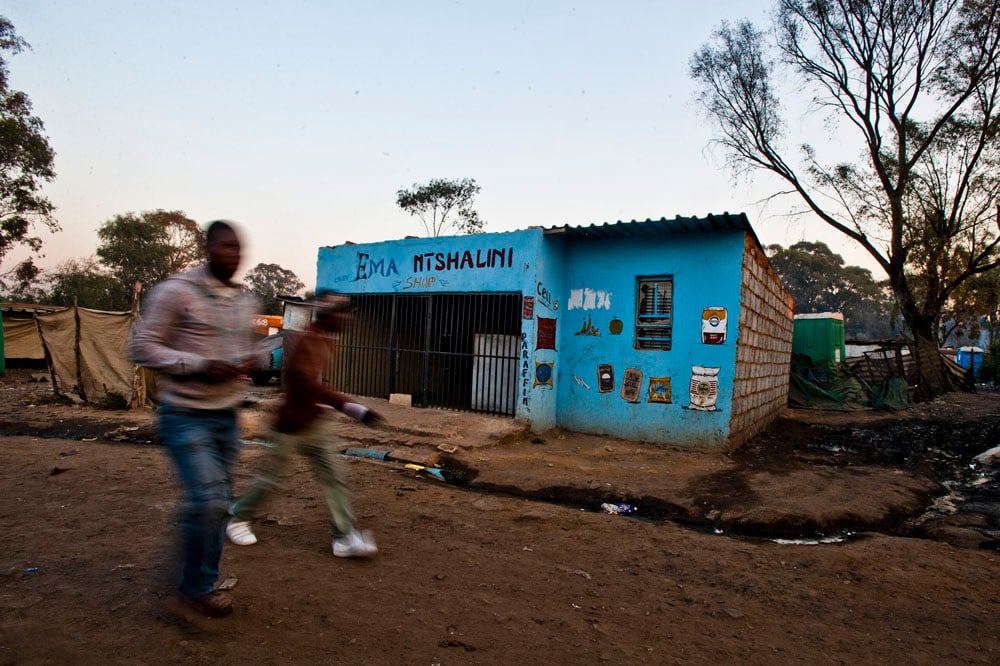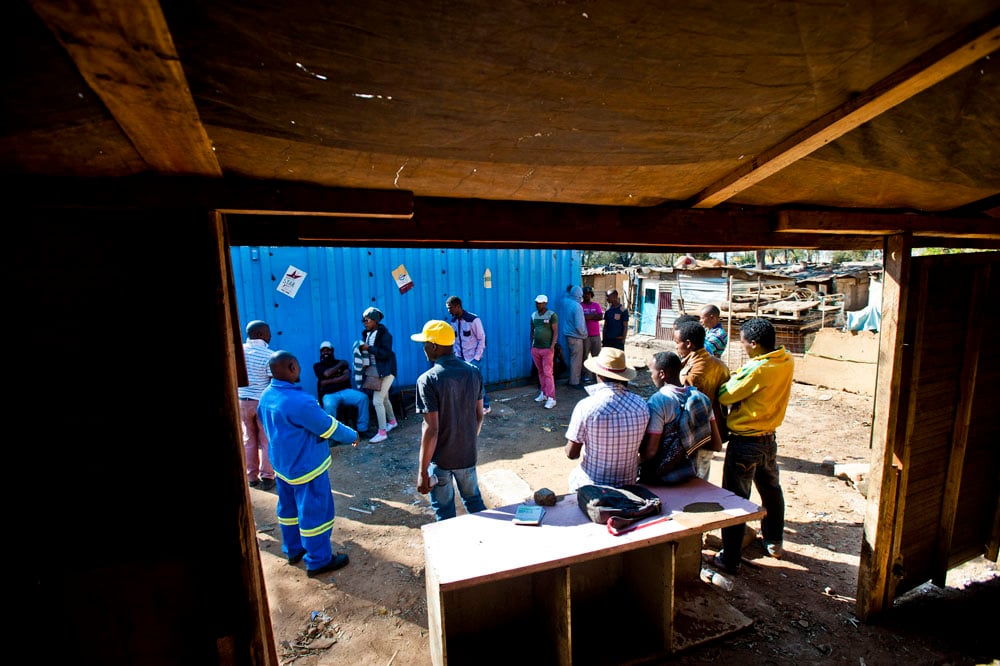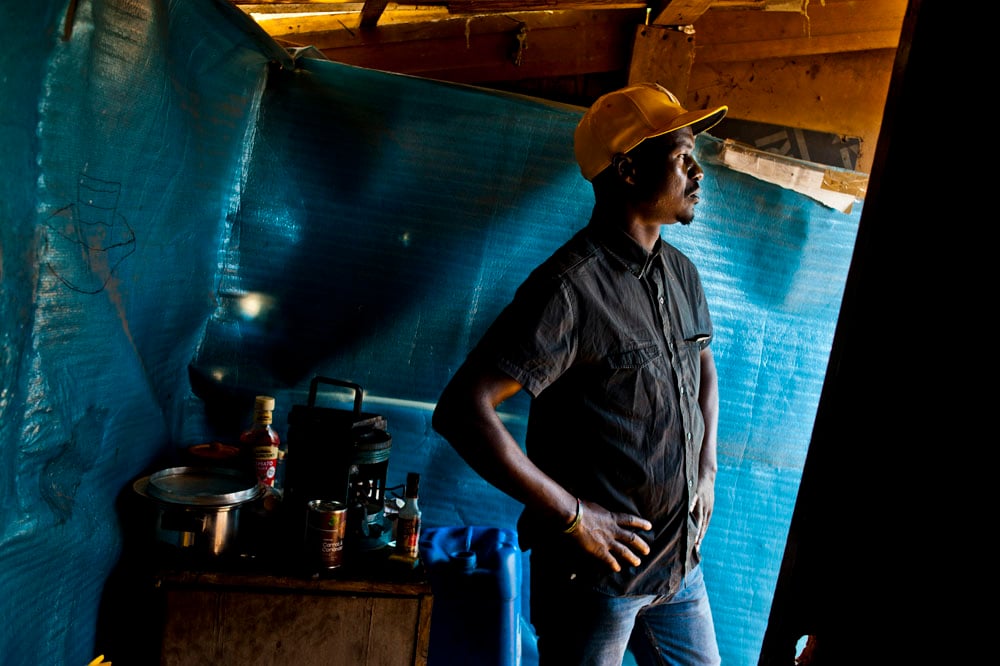The Marathon informal settlement in Germiston was a flashpoint during April's attacks.
No one who lives there can remember how the informal settlement of Marathon came by its name, but most agree it came into being sometime in the mid-1990s.
Located on the edge of Germiston in Ekurhuleni, just 30 minutes from the Johannesburg city centre, it is home to South Africans from all over the country, as well as Zimbabweans, Mozambicans, Malawians and Somalis.
There is no official sign to the squatter camp, and locals will direct you to the BP garage at the end of President Street. Opposite the petrol station the shacks of Marathon are stacked together without a coherent plan, unlike the linear spatial arrangement of most townships.
Marathon is a good place to stay if you are looking for a job. It is close to Johannesburg and to industrial areas on the East Rand, where many manufacturing firms drop off waste that can be recycled. Much of the waste spills over into the streets, with sewage filling puddles and potholes. Little kids float plastic bags as play-boats in the dirty water.
During the wave of xenophobic attacks that spread to Johannesburg and surrounding areas in April, Marathon’s many foreigners fled their homes and took refuge in temporary camps in nearby Primrose.
It is now a month after the attacks and the Mail & Guardian spent four days in the informal settlement to see whether foreigners have successfully reintegrated into the community.
Angry mob
We meet Vincent Chareka, a Zimbabwean who has lived in Johannesburg since 1998 and speaks all 11 of South Africa’s official languages, at the petrol station.
Chareka tells us he hid under his friend’s couch on the Thursday night when the “madness” started. An angry mob attacked foreign-owned shops and shot two of their owners. The foreigners in the community fled to the camps set up by the government because they feared for their lives, he says.
However, most foreign migrants have since moved back to Marathon after the informal settlement’s community leaders went to the camps and persuaded them to return.
“They said they will protect us from the small group that started the attacks,” Chareka says, using his hands to help tell the story. “They came with a new community leader who is now the security head of Marathon. So we are back.”
Chareka tells us we must be introduced to Marathon community chairperson Patrick Ngobeni to obtain permission to film and interview the locals. “For our own safety and security. And when they know you are around, there will be no trouble for you,” he says.
Internal politics
Ngobeni sits on a wooden bench outside his shack. He switches easily between isiZulu, Sesotho and English. He tells us the attacks against migrants were not necessarily because of hatred but rather internal community politics. He alleges that some disgruntled people who were not voted into the leadership structures are behind the so-called xenophobic attacks. He adds that these people also have spaza shops and find it difficult to compete with foreigners’ prices.
“They did it to destabilise the community so that, when there is complete madness, they can go to the community and say the new leaders are weak and cannot control the young people,” he says.

Not all foreign shop owners in Marathon have dared return to their businesses after the recent flare-up of xenophobic violence. (Photos: Delwyn Verasamy, M&G)
Ngobeni claims these people, who now call themselves concerned groups, fuelled the attacks against the foreigners because “bana le kwaal [they are envious]”, believing there is money and power in being a community leader. He says these “concerned groups” filled young people in the community with wrong ideas, such as the notion that foreigners are stealing their jobs.
“How else would you explain old men buying young people alcohol and inviting them to drink in their homes? These are the people who fill ideas into these young ones. The young people believe them and they organise themselves. Then they target foreigners and foreign-owned businesses and steal from them,” he says.
Ngobeni tells us the police were too afraid to come into Marathon on that Thursday when the violence flared up. He says he went to the Germiston police station and asked for help, but was told there weren’t enough vans or police officers on duty. The attacks escalated.
We make our way through the shackland to Chareka’s house. He says he no longer fears for his life because now there’s a man who protects foreigners in the community.
Foreign protector
On our way a heavy-set man calls out to Chareka: “Uhamba na maDanone, into zimnandi [You are walking with Danone yoghurts, very nice things]!” He is making a tongue-in-cheek reference to me and a fellow female Mail & Guardian colleague.
The man sits on a bench outside a half-built spaza shop. His stomach bulges over his pants. He has a loud laugh but speaks in a soft, low voice – and only in isiZulu.
Chareka tells us this is the man responsible for taking care of all the foreigners and foreign-owned shops in the squatter camp. Let us call him Mbuyiseni Ndlovu; he does not want his real name used as he admits to owning a number of unlicensed firearms.
Chareka says Ndlovu led the discussions at the Primrose refugee camp a few days after the xenophobic attacks. During those discussions, Ndlovu apparently gave his word that he would protect all foreigners and their businesses in Marathon – at a price, of course.
Ndlovu explains: “I am a person that looks after the shops. There is nothing I don’t know here. I have lived in Mozambique, in Zimbabwe, in Malawi and I was never attacked.
“Why should they [foreigners] get attacked here? We are all from emkhukhwini [the shacks]. We are all here because we are poor. How are you going to attack and steal from another poor person?”
‘My big machine gun’
Ndlovu owns a number of minibus taxis and also has several spaza shops in Marathon, run by Somalis. He also rents out shacks to migrants for R100 a month.
Ndlovu tells us that, when “this thing” – the attacks – started that Thursday, one of his shop managers called him to say that foreigners were being attacked.
“I was in Pretoria at the time. On Friday, I woke up early to go home [to KwaZulu-Natal] giyolanda umshini wame omkhulu [to fetch my big machine gun]. Home is seven hours away. I hired a Mercedes-Benz and paid R2 000. Then I got back here at five,” says Ndlovu.

At a meeting in Marathon last week, a resident offered to protect foreign-owned spaza shops – for a fee.
He says he patrolled the streets of Marathon with his machine gun that night, holding it clearly for all to see. On the Saturday he called on six of his men to return to Marathon from KwaZulu-Natal to patrol the streets with him. He walked the streets until 1am. “I even got flu from the patrol,” he says.
Ndlovu is never without a gun. “Even now I have one here,” he says and pats the pistol at his waist. “You see, everyone has a gun here, even the smallest guy you [wouldn’t] suspect. But I have the biggest gun and no one would dare come to me, my men or harass any foreigners while I am here,” he says.
Afraid to die
He says the police told him they were afraid to die, and so they waited for him to collect the xenophobic troublemakers and hand them over at the BP garage.
Ndlovu has since stationed six of his men around Marathon, where they keep watch and control the troublemakers.
On the Saturday, the community leaders approached him and asked him to join them formally as the person responsible for security. But he says he was not happy with the manner in which they had handled the xenophobic attacks.
“This [the attacks] happened on Thursday; why didn’t they call a meeting on Friday and say: ‘This is not right, what happened yesterday. If we see anyone do it, we will do one, two and three to them.’ Why didn’t they do that?” he says.
The settlement’s leaders finally called a meeting on the Sunday, three days after the attacks. Ndlovu was asked to address the gathering.
“I told them at the meeting on Sunday that ‘one touch foreigner, one bullet’. They were all there; the meeting was full – they heard me. A person must go work and stop attacking others,” he says.
Promise of protection
After the meeting, Ndlovu and the leaders went to the camps and asked the Marathon foreigners to return. Chareka tells us that most of them returned to their homes, but only did so because they are under Ndlovu’s protection.
Ndlovu then invites us to attend a meeting he is going to have with foreign business owners. The issues on the agenda include regulating the number of foreign-owned businesses in Marathon, assessing how many want to be under his protection, and protection fees.
He tells the gathering that he was the first person to open a shop in Marathon and was attacked for bringing in migrants to look after his spazas.

Vincent Chareka, who hails from Zimbabwe but is fluent in all South Africa’s 11 official languages, hid under a friend’s couch on the night that the rioting and shooting erupted among the shacks in Marathon.
“Two guys came to shoot me because I brought two Somalis in here. It pains me that, when I call you for a meeting, you are arguing with each other. I offered my life and made sacrifices to protect your shops when people were fighting,” he says.
Ndlovu takes out a piece of A4 paper and asks the shop owners who wish to be under his protection to write down their names, shop names and phone numbers.
“Is there anyone who doesn’t want me to look after his shop? If you want me to take care of the shops, come and write your name down here,” he says.
Hired security
He tells the foreign spaza shop owners that none of his own shops, or those under his protection, were attacked during the April xenophobic riots. Ndlovu says, if they sign up for his protection, he will be responsible for them and that anyone who attacks them will have to answer to him.
All 16 shop owners at the meeting carefully write their names on the paper. Any name that is not on the paper cannot be added at a later stage. The names are to be taken to the police station, where the shop owners must sign to agree to the terms and conditions listed.
Every shop owner is to pay R400 a month during times of stability; this fee will escalate to R1 000 should violence flare up. Ndlovu says his men can be trusted because, “if I hear one of my patrollers make a mistake, I take down his shack, I take his gun and I shoot him”.
The shop owners nod in agreement. On Tuesday they will go to the Germiston police station to certify their signatures.
They feel safe. For now.